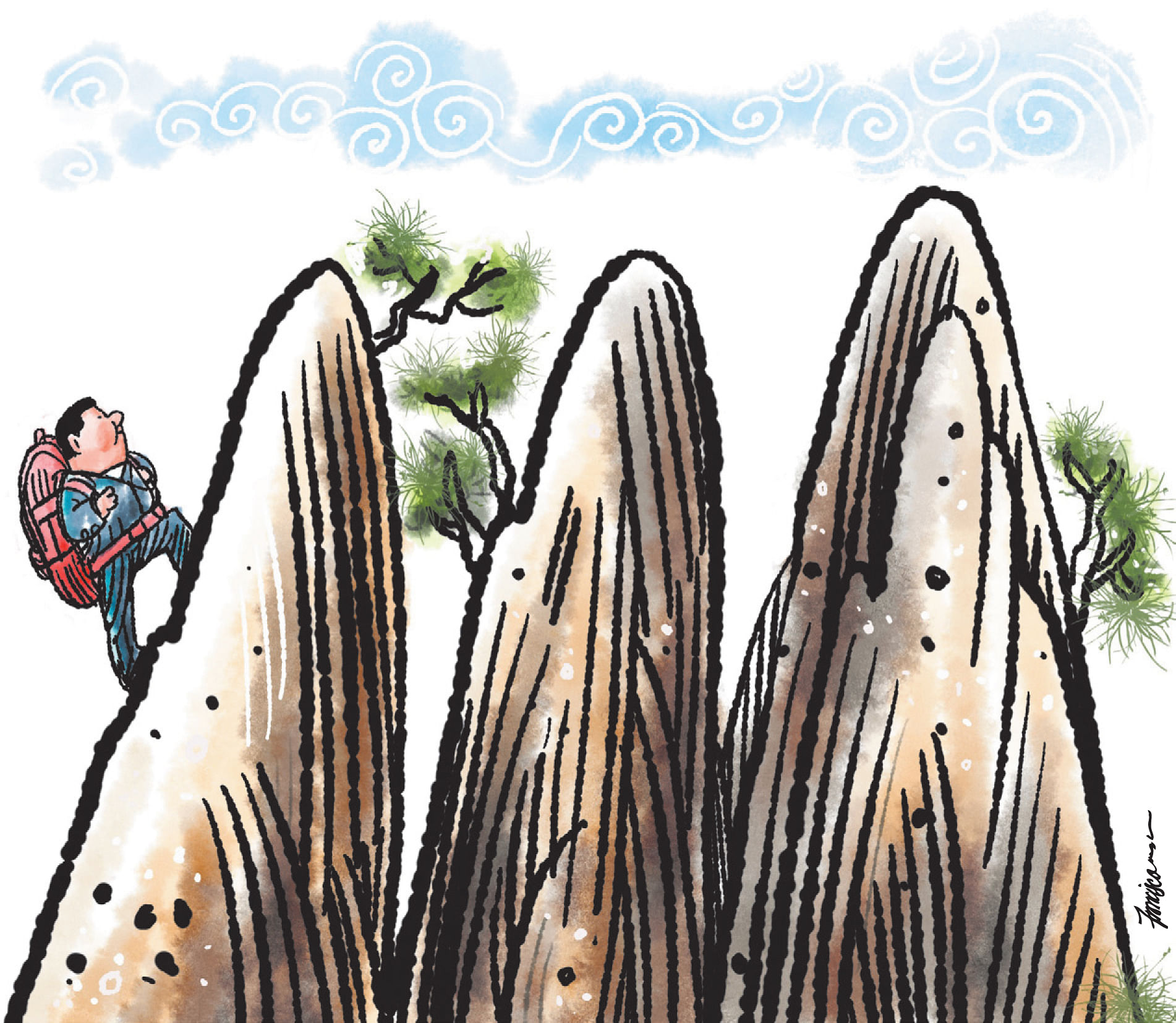For Chinese President Xi Jinping, grappling with the pandemic these past five months was no easy task. As the contagion's threat abates, the really hard part begins amid China's return to the normal rhythms of life.
On the home front, there are a multitude of challenges, including fortifying an anaemic economy, reining in joblessness, boosting exports, averting a bankruptcy domino effect and stemming an exodus of foreign manufacturers.
Externally, there are diplomatic fires on many fronts, including the United States, the United Kingdom, Australia, Canada and India. Hong Kong has flared up again as a source of international friction, while disputes involving the South China Sea remain unresolved. The issue of reunification with Taiwan is on the back-burner for now.
"Mao Zedong toppled the 'three great mountains' of imperialism, feudalism and bureaucratic capitalism that weighed down on the backs of the Chinese people for more than a century," a source with ties to the Chinese leadership told The Straits Times.
"Xi has three new great mountains to conquer: containing the pandemic, restarting the economy and managing diplomatic crises," the source said, requesting anonymity.
Mr Xi appears close to conquering the first great mountain. China has managed to overcome the worst of the pandemic, with infection rates and deaths from Covid-19 under control.
The challenges now have to do with averting a second wave of infections and the race against time to develop a vaccine.
Initial forecasts from hawks in the West that Covid-19 could prove to be China's Chernobyl moment have not come to pass.
Although there are no surveys to assess public sentiments on how the Chinese feel about the management of the crisis, it would appear that Mr Xi has come off largely unscathed, compared with officials in Wuhan who fumbled the containment of the disease when it first surfaced in the city.
"Right now, China's management of the pandemic within the country is directly linked to his name and prestige. So China's management cannot fail," said Dr Hoo Tiang Boon, a China watcher at the S. Rajaratnam School of International Studies, of Mr Xi.
That China has so far done well in curtailing the spread of the contagion would suggest that the outcome has benefited Mr Xi's standing and political agenda domestically, even if it is too early to take a victory lap.
THE GOOD EMPEROR
Shanghai-based venture capitalist Eric Li has likened Mr Xi to a good emperor in a Foreign Policy article.
Although an imperial label sounds odd for the leader of the Chinese Communist Party (CCP), it makes sense in that Mr Xi has had a good crisis despite the massive lockdowns and other tough measures taken to contain the spread of the virus.
The results have reinforced the image of a tough but steady leader who delivers when faced with a life-threatening crisis for the nation, even more so when set against the turbulent and chaotic leadership of US President Donald Trump.
To be sure, the CCP's handling of the crisis was far from perfect.

There was certainly criticism, especially from the growing middle class. Indignation coalesced when millions of social media users mourned the death in February of Dr Li Wenliang, 34, a Wuhan ophthalmologist who warned other doctors online about the possibility of a new pathogenic outbreak, but ended up being hauled up by the police for spreading rumours.
But the powers that be were able to douse that fire by posthumously declaring Dr Li a "martyr".
It also helped that online censors and state media have been hard at work to mute criticism and play up the good news, including heart-warming stories of sacrifice by dedicated front-line workers giving their all to save lives at the height of the crisis.
The upshot is that US accusations that China under-reported infections and deaths have not resonated with ordinary Chinese. If anything, perceived US bullying has only galvanised Chinese citizens to support their leaders and country.
THE ECONOMIC MOUNTAIN
It is unclear at this juncture how Mr Xi will fare against the second great mountain.
In a speech to Parliament last month, Premier Li Keqiang pledged to buoy the economy and curb unemployment. But he did not set a growth target for fiscal 2020 because "the global epidemic situation and economic and trade situation are very uncertain".
Up to 70 million people are out of a job, and more than 460,000 enterprises went belly up in the first quarter when China's economy shrank 6.8 per cent, the first contraction in decades.
Whatever economic measures Premier Li has in the pipeline to mitigate the pain, the road ahead is daunting. Again, China's propaganda apparatus will have to be in overdrive to counter the setbacks and hardships ahead by pointing out that the rest of the world is not better off.
In terms of economic strategy, China is likely to look inward, boosting infrastructure and consumer spending, and relying less on exports; this strategy is in part a product of the hostile external environment presented by the third great mountain.
HOSTILE EXTERNAL ENVIRONMENT
The third great mountain is without doubt the hardest to conquer, with the all-important relationship with the US already marred by several dangerous rockfalls.
Mr Trump announced last Friday that he will strip several of Hong Kong's special privileges with the US and bar some Chinese students from US universities over China's plan to force through a controversial national security law for Hong Kong.
Beijing's response is, unsurprisingly, an angry one, especially given that it has long seen the US as the "black hand" behind months of unrest in the city last year.
The Chinese vetoed a US and UK proposal for a United Nations Security Council meeting over the national security law, while the Global Times newspaper accused Washington of rallying Western officials and instigating Western media outlets to attack China on this new front.
Mr Trump, whose re-election in November looks shaky as a result of his calamitous handling of the Covid-19 crisis, is now in even greater need of a scapegoat.
Accordingly, he has ramped up his anti-China rhetoric, taken action against Chinese telecoms giant Huawei, and made other moves aimed at decoupling the world's two biggest economies while deflecting attention from the dire state of the US economy.
The search for the origins of the Sars-CoV-2 virus has evolved from what should have been a dispassionate scientific inquiry into an ugly blame game, spiked with conspiracy theories lobbed by the US and China against each other.
As American economist Stephen Roach observed recently in Project Syndicate: "From an unnecessary trade war to an increasingly desperate coronavirus war, two angry countries are trapped in a blame game with no easy way out. This is a tragic outcome for both sides - and for the world."
China is clearly facing challenges on several fronts, and Huawei's current problems illustrate how this pans out at a time when other countries are increasingly wary of China's growing clout, including in the technology sector.
The UK is reported to be drawing up plans to force a full phase-out of Huawei from the country's 5G networks within three years, for national security reasons.
Separately, the US has made it even harder for Huawei to operate by blocking global chip supplies to it.
A Canadian court last week rejected a bid by the daughter of Huawei's founder to have her US extradition case thrown out.
China has branded Canada an "accomplice" in the case against Meng Wanzhou, who is accused by the US of violating American sanctions against Iran.
To make matters worse, China's detention of two Canadians - Michael Kovrig, a former diplomat, and Michael Spavor, a businessman - is seen in Ottawa as retaliation for Meng's arrest. Canadian Prime Minister Justin Trudeau has described their continued detention as "arbitrary".
"Canada has an independent judicial system that functions without interference or override by politicians. China doesn't work quite the same way and doesn't seem to understand that," he remarked recently.
China suspects Australia of acting at America's behest when it called for an international investigation into the origins of the pandemic.
Recent Chinese actions against Australian beef and barley imports are seen as retaliatory moves.
China also faces accusations of taking advantage of a world distracted by Covid-19 to assert its territorial claims in the South China Sea and the Himalayas. Tensions are high in Ladakh, in the disputed Kashmir region, with stand-offs in at least three places as well as in Naku La, on the border between China and the north-eastern Indian state of Sikkim.
The confrontations fit "a broader pattern of Chinese assertiveness", Dr Tanvi Madan, director of The India Project at the Brookings Institution in Washington, told The New York Times, noting that it was the fourth flare-up since Mr Xi rose to power in 2012.
The Chinese in turn see the Trump administration as working to "drive a wedge" between the two Asian neighbours.
Mr Xi has sought to defuse tensions by avoiding a head-on confrontation. He has agreed to a World Health Organisation-led review of the global response to the pandemic after the contagion is contained.
He has also promised to make any vaccine China develops a "global public good" and pledged funds to help poorer countries weather the fallout of the pandemic.
In contrast, Mr Trump has threatened to end funding for the WHO, accusing it of kowtowing to Beijing.
While Mr Trump's loose-cannon and belligerent approach to international relations has done the US no favours, it does not mean Mr Xi will have an easy time of it either.
Countering accusations of China's role in the global outbreak is just one aspect of a bigger problem.
The bigger challenge is dealing with the backlash in the West and elsewhere over China's rise, and the impact of that rise on their economies and areas of disputes with China. Rightly or wrongly, China is seen as having gained an advantage in the globalised system and is also seen as exploiting it at the expense of others.
Mr Xi's political skills will be tested to the max in dealing with these grievances while asserting China's national interests, all the while keeping in check the more extreme nationalist elements at home.
With no limits on his term in office, Mr Xi technically has more time than Mr Trump in the great power contest. But given the sentiments in the US, the hostility will not go away even if Mr Trump fails to secure a second term in office. In which case, Mr Xi will need all the tenacity of the old man who sought to literally move a mountain in the Chinese fable of Yugong Yishan.
• With additional input by Tan Dawn Wei

